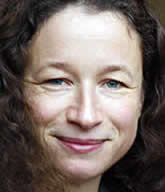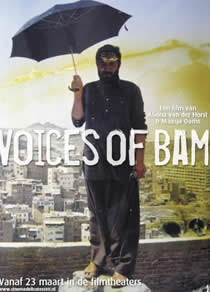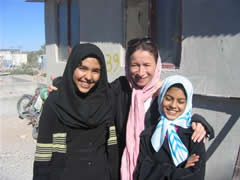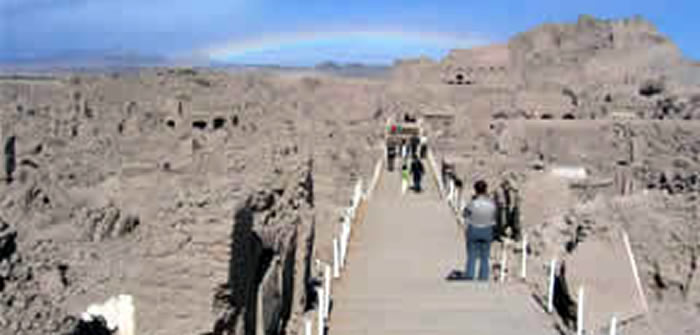 “In Bam I met a man who was lost his wife and two daughters and he had only their picture…”
“In Bam I met a man who was lost his wife and two daughters and he had only their picture…”
After the horrible earthquake of December 2003 in Iranian oldest city “Bam”, Aliona van der Horst, Dutch-Russian Documentary maker was there to make her long documentary called “Voices of Bam”. A 90 minutes poetic documentary showing the lives of earthquake survivors while listening to their inner dialogues with their lost dears.
Aliona van der Horst, Dutch- Russian documentary maker, born in Moscow and grew up in Holland, has studied Russian Language and Literature in Amsterdam (1993) and then later finished her studies at Dutch Academy of Cinema and Television (1997) in Documentary filmmaking. She has made different documentaries for Dutch Television and awarded several times in different national and International film festivals. “Voices of Bam” has been shown in International Film Festival Rotterdam 2006, is awarded in Vision du Reel Nyon /France and has won the Special Jury Prize at Tribeca Film Festival NY and the best Feature Documentary at Dokufest, Kosovo.
Shohreh Jandaghian- What made you want to make a documentary about Bam at that time?
Aliona van der Horst- I was walking with my husband at second day of Christmas 2003 and talking about visiting that old city with old castle in Iran. I couldn’t  remember the name at that time. In that evening when I switched on TV, the old city was totally ruined because of a massive earthquake and that was the city Bam.
remember the name at that time. In that evening when I switched on TV, the old city was totally ruined because of a massive earthquake and that was the city Bam.
The second reason is that I heard about a woman who went to Bam to dig up pictures of the people under the ruins and she wanted to give these pictures back to the survivors helping them reconstructing their memories with their lost persons. I got intrigue by that and contacted the Photographer, Parisa Damandan. We went to the place and gave the pictures back to the people.
Shohreh- How did you come about recording “voices of survivors”?
Aliona- Since a long time I wanted to use inner voices as a mean for a film. For example in Wim Wenders’ Film, Wings of Desire, people are thinking during biking and angles can hear them. I thought that is a powerful device to use this.
When I was in Bam I met a man who was lost his wife and two daughters and he had only their picture, which was hanging on the wall. He was talking to them everyday. I asked him if he would do it loud in front of me. He accepted because he loved to talk to his deaths. It was very strong and intimate moment. We were sitting there and almost crying. It was incredibly sad! Then I asked other people to come to my hotel’s room and record their voices as they were talking to their lost families.
I think Iranian have a very strong and incredible imagination. It was not strange for them to do this. I think if I would ask Dutch people to do so, they would think that I’m crazy!
 Shohreh- Did you know about Iran before making “voices of Bam”?
Shohreh- Did you know about Iran before making “voices of Bam”?
Aliona- A little bit. The image I could imagine from Iran was different from what you normally see in the Media and it’s because of my Russian background. You know, during Soviet Union people in here were thinking that Russia is a terrible place and they were afraid to go there. But as I had my family there, I was going nearly every year to Moscow for a holiday and it was totally different. Lots of people even didn’t believe in Communism. So, I was thinking it should be the same with Iran.
Shohreh- Has the film ever shown in Iran?
Aliona- We will send it for this year’s edition of Fajr Film Festival, we don’t know if they would take it. But we showed it to the people who were in the film in Bam.
Shohreh- How did they react to the film?
Aliona- They were very proud of them being in the film. They were surprised and laughing about themselves. They were happy that people in the world can see them. I think the film did a lot of good to them. I remember when I was filming them they were extremely depressed and sad but a year after when I met them again to show them the film, you could see more life in their eyes.
Shohreh- What about the viewers out of Iran?
Aliona- Well, it’s not a blockbuster! You know, some people are afraid of Iran and earthquake, so they think this film shouldn’t be easy to see. But lots of people after watching it, loved it very much because it was an uncompromising film with a hopeful ending. The camera moves through the city like a ghost and listens to people thoughts.
There were also viewers who didn’t like it because they wanted to know how many people were dead, when Bam is going to be rebuild and so on. You don’t get these kinds of information in the film. Maybe people expected something else because of the title.
Shohreh- have you ever thought about making fiction film?
Aliona- Maybe in ten years… I’m too afraid to do it! It’s very much constructed in a way. But sometimes I think to do maybe an improvised fiction because it is too close to the documentary style.
Shohreh- How do you see status of documentary making today?
Aliona- Ten years before when I was still in film school, everybody was talking about the death of documentary films, and it became a fashion to make “Mocumentary”, means fake documentary. You asked yourself why I should do documentary?
But today, it’s a strange turning point and you see that directors like Michael Moore can bring a wide range of audiences to the theatres to see a long documentary. As TV doesn’t take effort to show long documentaries in lots of countries, (in Holland it’s still Ok), that makes people to go to the theatres or buy DVDs to watch documentaries, because people would like to get in touch more with the realities around them.
Shohreh- Do you plan on doing another documentary?
Aliona- I’m teaching and waiting for the next idea. I don’t want to make one film a year. It’s hard to make a film! Lots of directors have families and want to make money but there are actually less who can do it with a certain quality. For me I need to feel very passionate about a theme to make a film because then I have to spend one or two years of my life working on it, doing researches and so on. So, I don’t promise myself… I would rather teach or make short films. But I maybe I should stand out!
Shohreh- I wish you success Aliona, and thanks for your time.

